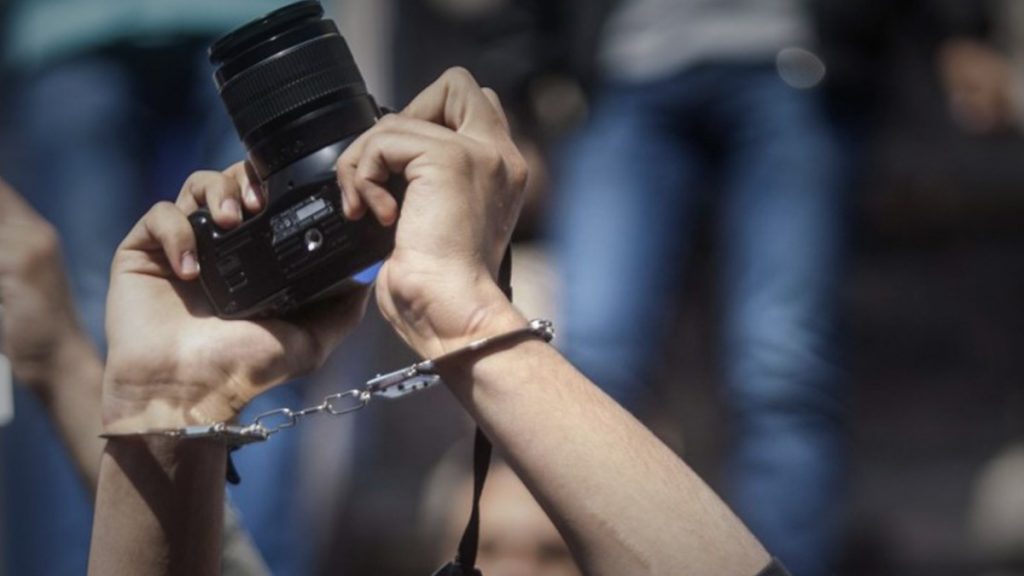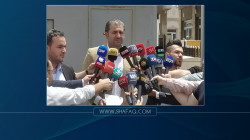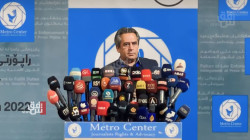Press freedom in Iraq: Challenges and threats on World Press Freedom Day

Shafaq News/ Iraq's two-rank descent in the 2024 Press Freedom Index to 169th globally out of 180 nations strikes a concerned note on World Press Freedom Day. The sobering reality is further accentuated by official documentation illuminating Iraqi journalism's harsh challenges.
Today, as the world commemorates World Press Freedom Day, a day enshrined by the United Nations on May 3rd each year, there's a poignant reflection on the state of press freedom in Iraq.
Iraq's Press Freedom in Crisis
According to the 2024 Press Freedom report released by Reporters Without Borders, the political indicator experienced a downturn among the five metrics linked to press freedom, dropping by 7.6 points on a global scale.
In the same report, Iraq's ranking for press freedom plummeted to 169th globally out of 180 countries for 2024, marking a descent of two positions from the previous year, 2023, when it stood at 167th globally.
The decline in Iraq's press freedom score is stark, falling from 32.9 points in 2023 to 25.4 points in 2024. This downturn is echoed across multiple indicators: the political indicator decreased from 39.2 to 20.6, the economic indicator from 28 to 22.1, the social indicator from 36 to 29.4, and the safety indicator from 29.9 to 28.6 points.
Reporters Without Borders report said, "terrorism, political instability, and protests, journalists face threats from all sides and come up against the weakness of the state, which is failing in its duty to protect them."
"Iraq's media are closely linked to its political parties, which control their editorial policies. The TV channel Al-Forat, for example, is linked to the Islamic Supreme Council of Iraq (one of the main Shia parties). Religious communities have their own media outlets, such as the Christian Ishtar TV. The Kurds are very organized in media terms, and opposition parties find their voice through channels such as NRT TV, which is linked to the "New Generation" movement." The report explained.
Concerning political influence and polarization, the report pointed out that the pervasive influence of politics has led to extreme polarization within Iraqi media, rendering impartial reporting a rarity.
"Journalists struggle to defend their rights, and most have been subjected to constant threats since 2019. Many media outlets have been attacked and ransacked due to their coverage of anti-corruption protests, deemed hostile to certain political currents. In Kurdistan, critical journalists have been accused of espionage and imprisoned."
While Iraq's constitution theoretically upholds press freedom, conflicting laws often undermine these rights. Journalists regularly face defamation lawsuits from public figures, hindering investigative journalism. Additionally, proposed cyber-crime legislation threatens severe penalties for online content deemed detrimental to national interests, including life imprisonment.
In addition, financial disparities in media funding exacerbate political biases, with well-resourced parties wielding greater influence over affiliated outlets.
According to the report, many media organizations compromise editorial independence due to financial constraints, leading to closures or compromised reporting. Independent outlets, often local, struggle for survival despite finding audiences on social media platforms.
On the sociocultural level, the report said that certain institutions and figures "remain untouchable," with media outlets facing repercussions for investigating corruption involving influential individuals. "They are accused of violating media regulations or damaging symbols of the state."
"Iraq remains a dangerous place for journalists, with armed groups targeting and silencing them through violence and intimidation. Despite numerous killings, perpetrators often escape justice, perpetuating a culture of impunity. Threats and abductions are common tactics used to instill fear and stifle free speech, affecting journalists of all profiles." The report said.
Amid Iraqi authorities' affirmations, concerns about press freedom in Iraq have been raised.
The Iraqi Journalists Rights Defense Association revealed increased cases of detention, arrest, legal pursuit, and harassment aimed at hindering media coverage from May 2023 to May 2024.
"This escalation raises severe concerns about the country's deteriorating freedom of journalistic work."
According to a report from the Association, there has been a notable rise in judicial rulings, arrest warrants, summons, and absentia verdicts against journalists based on laws inherited from the previous dictatorial era."
The violations, as documented by the Association, "reflect systematic and aggressive methods used by authorities, sometimes by political entities and influential figures, to legally harass journalists, such as instructing security forces to chase journalists on the streets and prevent them from filming, as happened in Basra under orders from the governorate's police chief."
The Association's annual report noted that "among the new violations witnessed in Iraq regarding press freedom, authorities have violated all legal and constitutional frameworks by blocking access to several news websites, social media groups, or pages in a secretive and covert manner, without any explanation from any governmental entity."
The report further documented a total of 333 violations during the covered period, including detentions, arrests, injuries, raids or armed attacks on journalists' homes and media offices, physical assaults, obstruction or hindrance of work, and legal lawsuits.
These violations, according to the Association's report, included 53 cases of detention and arrest, 6 injuries, 12 armed attacks, 232 cases of obstruction, assault, or harassment, along with 22 legal lawsuits against journalists, and eight other miscellaneous cases.
During the monitoring conducted by the Association in recent months, April 2023 witnessed the highest number of violations, with 57 cases, followed by August, with 47 cases, of the total violations throughout the year.
Baghdad topped the cities with the most violations against journalists, with 66 cases, followed by Erbil, with 64 cases, and then Basra, with 54 cases.
Based on these findings, the Association has issued recommendations to the Parliament and international organizations concerned with human rights, freedom of expression, and press freedom.
Press Freedom in Kurdistan Region
Press freedom also came under fire in the Kurdistan Region, with the latest report of Amnesty International sheds light on a troubling record of press freedom violations.
The report condemns Kurdish authorities for their ongoing assault on the right to freedom of expression and press freedom. The documented assaults range from arbitrary detentions to physical violence and grossly unfair trials targeting journalists.
According to Amnesty, these acts of harassment, intimidation, and attacks against journalists have created a climate of fear, stifling the freedom of expression and press freedom in the Kurdistan Region.
"Many journalists have been forced into hiding, fled the region, or abandoned journalism altogether due to these pressures. Additionally, numerous journalists find themselves unjustly imprisoned, further undermining the region's media landscape."
However, the Metro Center for Journalists Rights and Advocacy recorded a decrease in press freedom violations in 2023 (249) compared to 2022 (431).
Iraqi Journalists Concerns
Journalist Shurooq Al-Ghanim paints a grim picture of press freedom in Iraq, highlighting journalists' myriad challenges.
According to Al-Ghanim, "obtaining information from official sources remains daunting due to persistent bureaucratic hurdles, including the need for permits and security approvals despite their supposed abolition years ago. These obstacles significantly impede journalists' ability to work effectively, particularly in the field."
Al-Ghanim asserted to Shafaq News Agency that press freedom in Iraq "does not exist," contending that celebrating press freedom is "disingenuous, given the harsh reality on the ground where journalists routinely encounter harassment, threats, and even assassination, with security agencies failing to disclose the perpetrators."
In the same context, Journalist Karar Al-Asaf revealed many obstacles facing journalists, including the right to information, security forces' harassment of reporters and others in the field, and sometimes denial of access to specific files, especially related to corruption.
Al-Asaf said, "Those investigating corruption, armed groups, or loose weapons face physical attacks. Many journalists also face lawsuits, summonses, and court appearances, hindering their journalistic work and limiting coverage of negative issues in government and society."
In turn, Journalist Manal Al-Mutasim noted, "Real journalism is a power, a weapon, truth, and transparency. However, it has drifted away from all that in recent years, becoming distant from real discourse and presenting topics with transparency and high professionalism.

